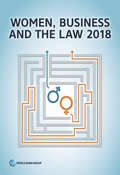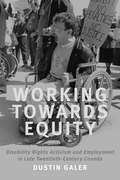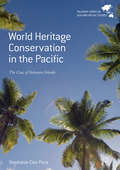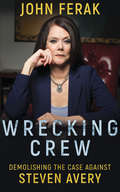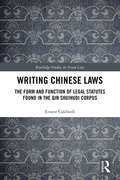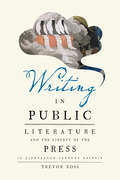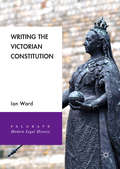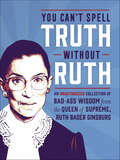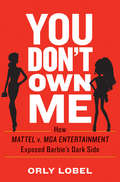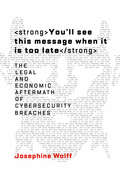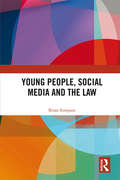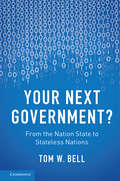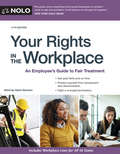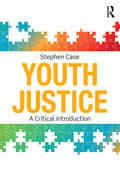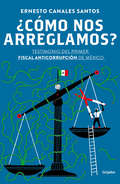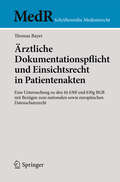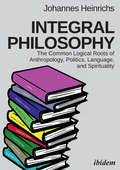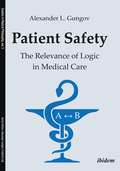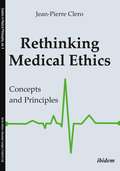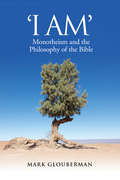- Table View
- List View
Women, Business and the Law 2018
by World Bank GroupHow can governments ensure that women have the same employment and entrepreneurship opportunities as men? One important step is to level the legal playing field so that the rules for operating in the worlds of work and business apply equally regardless of gender. Women, Business and the Law 2018, the fifth edition in a series, examines laws affecting women’s economic inclusion in 189 economies worldwide. It tracks progress that has been made over the past two years while identifying opportunities for reform to ensure economic empowerment for all. The report updates all indicators as of June 1, 2017 and explores new areas of research, including financial inclusion.
Working towards Equity: Disability Rights, Activism, and Employment in Late Twentieth Century Canada
by Dustin GalerIn Working towards Equity, Dustin Galer argues that paid work significantly shaped the experience of disability during the late twentieth century. Using a critical analysis of disability in archival records, personal collections, government publications and a series of interviews, Galer demonstrates how demands for greater access among disabled people for paid employment stimulated the development of a new discourse of disability in Canada. Family advocates helped people living in institutions move out into the community as rehabilitation professionals played an increasingly critical role in the lives of working-age adults with disabilities. Meanwhile, civil rights activists crafted a new consumer-led vision of social and economic integration. Employment was, and remains, a central component in disabled peoples' efforts to become productive, autonomous and financially secure members of Canadian society. Working towards Equity offers new in-depth analysis on rights activism as it relates to employment, sheltered workshops, deinstitutionalization and labour markets in the contemporary context in Canada.
World Heritage Conservation in the Pacific: The Case of Solomon Islands (Palgrave Series in Asia and Pacific Studies)
by Stephanie Clair PriceThis book explores the opportunities and challenges associated with the legal protection of World Heritage sites in the Pacific Islands. It argues that the small Pacific representation on the World Heritage List is in part due to a lack of strong legal frameworks for heritage conservation, putting such sites under threat. Providing a comprehensive analysis of the nomination, listing and protection of the Solomon Island World Heritage Site, it examines the implementation of the World Heritage Convention in the Pacific context. It explores how the international community’s broadening interpretation of the notion of ‘outstanding universal value’ has increased the potential for Pacific heritage to be classified as ‘World Heritage’. This book also analyses the protection regime established by the Convention, and the World Heritage Committee’s approach to heritage conservation, identifying challenges associated with the protection of Pacific Island heritage.
Wrecking Crew: Demolishing the Case Against Steven Avery
by John FerakA &“fascinating&” deep dive into the Making a Murderer case. &“Get ready to change your mind or be more convinced than ever&”(Steve Jackson, New York Times bestselling author). In 2016-17, while working for the USA Today Network&’s Wisconsin Investigative Team, author John Ferak wrote dozens of articles examining the murder case again Steven Avery, who had already beat one wrongful conviction only to be charged with the murder of Teresa Halbach in 2005. The case became the wildly successful Netflix Making A Murderer documentary. In Wrecking Crew: Demolishing the Case Against Steven Avery, Ferak lays out in exacting detail the post-conviction strategy of Kathleen Zellner, the high-profile, high-octane lawyer, to free Avery. To write this book, Zellner, perhaps America&’s most successful wrongful conviction attorney, gave Ferak unique access to the exhaustive pro bono efforts she and her small suburban Chicago law firm dedicated for a man she believes to be a victim of an unscrupulous justice system in Manitowoc County. &“If you&’re planning to binge-watch Making a Murderer 2 over the holidays, order John Ferak&’s new book Wrecking Crew, too. Definitive chronicle of criminal justice corruption in Manitowoc County.&”—Michelle Malkin, host of Michelle Malkin Investigates on CRTV
Writing Chinese Laws: The Form and Function of Legal Statutes Found in the Qin Shuihudi Corpus (Routledge Studies in Asian Law)
by Ernest CaldwellThe legal institutions of the short-lived Qin dynasty (221–207 BCE) have been vilified by history as harsh and draconian. Yet ironically, many Qin institutional features, such as written statutory law, were readily adopted by subsequent dynasties as the primary means for maintaining administrative and social control. This book utilizes both traditional texts and archeologically excavated materials to explore how these influential Qin legal institutions developed. First, it investigates the socio-political conditions which led to the production of law in written form. It then goes on to consider how the intended function of written law influenced the linguistic composition of legal statutes, as well as their physical construction. Using a function and form approach, it specifically analyses the Shuihudi legal corpus. However, unlike many previous studies of Chinese legal manuscripts, which have focused on codicological issues of transcription and translation, this book considers the linguistic aspects of these manuscripts and thus their importance for understanding the development of early Chinese legal thought. Writing Chinese Laws will be useful to students and scholars of Chinese Studies, as well as Asian law and history more generally.
Writing in Public: Literature and the Liberty of the Press in Eighteenth-Century Britain
by Trevor RossWhat is the role of literary writing in democratic society?Building upon his previous work on the emergence of "literature," Trevor Ross offers a history of how the public function of literature changed as a result of developing press freedoms during the period from 1760 to 1810. Writing in Public examines the laws of copyright, defamation, and seditious libel to show what happened to literary writing once certain forms of discourse came to be perceived as public and entitled to freedom from state or private control. Ross argues that—with liberty of expression becoming entrenched as a national value—the legal constraints on speech had to be reconceived, becoming less a set of prohibitions on its content than an arrangement for managing the public sphere. The public was free to speak on any subject, but its speech, jurists believed, had to follow certain ground rules, as formalized in laws aimed at limiting private ownership of culturally significant works, maintaining civility in public discourse, and safeguarding public deliberation from the coercions of propaganda. For speech to be truly free, however, there had to be an enabling exception to the rules. Since the late eighteenth century, Ross suggests, the role of this exception has been performed by the idea of literature. Literature is valued as the form of expression that, in allowing us to say anything and in any form, attests to our liberty. Yet, paradoxically, it is only by occupying no definable place within the public sphere that literature can remain as indeterminate as the public whose self-reinvention it serves.
Writing the Victorian Constitution (Palgrave Modern Legal History Ser.)
by Ian WardThis book charts the writing of the English constitution through the work of four of the most influential jurists in the history of English constitutional thought—Edmund Burke, Thomas Babington Macaulay, Walter Bagehot and Albert Venn Dicey. Stretching from the French Revolution to the death of Queen Victoria, their writing is both representative of and formative to the Victorian constitution. Ian Ward traces how constitutional writing changed over the course of the long nineteenth century, from the poetics of Burke and the romance of Macaulay, to the pragmatism of Bagehot and the jurisprudence of Dicey. A century on, our perception of the English constitution is still shaped by this contested history.
You Can Stop Humming Now: A Doctor's Stories of Life, Death, and in Between
by Daniela LamasA critical care doctor's breathtaking stories about what it means to be saved by modern medicineModern medicine is a world that glimmers with new technology and cutting-edge research. To the public eye, medical stories often begin with sirens and flashing lights and culminate in survival or death. But these are only the most visible narratives. As a critical care doctor treating people at their sickest, Daniela Lamas is fascinated by a different story: what comes after for those whose lives are extended by days, months, or years as a result of our treatments and technologies?In You Can Stop Humming Now, Lamas explores the complex answers to this question through intimate accounts of patients and their families. A grandfather whose failing heart has been replaced by a battery-operated pump; a salesman who found himself a kidney donor on social media; a college student who survived a near fatal overdose and returned home, alive but not the same; and a young woman navigating an adulthood she never thought she'd live to see -- these moving narratives paint a detailed picture of the fragile border between sickness and health.Riveting, gorgeously told, and deeply personal, You Can Stop Humming Now is a compassionate, uncompromising look at the choices and realities that many of us, and our families, may one day face.
You Can't Spell Truth Without Ruth: An Unauthorized Collection of Wise-Ass Wisdom from the Queen of Supreme, Ruth Bader Ginsburg
by Mary ZaiaSpeaking the Ruth to AmericaRuth Bader Ginsburg became a Supreme Court Justice in 1993, but her popularity has exploded over the last couple of years as she has been adopted as a modern feminist icon. An octogenarian who has proven that disagreeing does not make one disagreeable, Ginsburg is well-known for her pithy observations as well as her strongly argued dissents. Beloved by many – including her ideological opposition, former Supreme Court Justice Antonin Scalia, who was her dear friend – Ginsburg’s wisdom has never been more relevant or more important to American democracy.Sample quotes:“Women belong in all places where decisions are being made…it shouldn’t be that women are the exception.”“Fight for the things you care about, but do it in a way that will lead others to join you.”“People ask me sometimes…When will there be enough women on the Court? And I say, ‘When there are nine.’ People are shocked. But there’d been nine men, and nobody’s ever raised a question about that.”“My mother told me two things constantly. One was to be a lady and the other was to be independent. For most girls growing up in the ‘40s, the most important degree was not your B.A. but your M.R.S.”“We have the oldest written constitution still in force in the world, and it starts out with three words, ‘We, the people.’”
You Don't Own Me: How Mattel v. MGA Entertainment Exposed Barbie's Dark Side
by Orly LobelThe battle between Mattel, the makers of the iconic Barbie doll, and MGA, the company that created the Bratz dolls, was not just a war over best-selling toys, but a war over who owns ideas. When Carter Bryant began designing what would become the billion-dollar line of Bratz dolls, he was taking time off from his job at Mattel, where he designed outfits for Barbie. Later, back at Mattel, he sold his concept for Bratz to rival company MGA. Law professor Orly Lobel reveals the colorful story behind the ensuing decade-long court battle. This entertaining and provocative work pits audacious MGA against behemoth Mattel, shows how an idea turns into a product, and explores the two different versions of womanhood, represented by traditional all-American Barbie and her defiant, anti-establishment rival—the only doll to come close to outselling her. In an era when workers may be asked to sign contracts granting their employers the rights to and income resulting from their ideas—whether conceived during work hours or on their own time—Lobel’s deeply researched story is a riveting and thought-provoking contribution to the contentious debate over creativity and intellectual property.
You'll See This Message When It Is Too Late: The Legal and Economic Aftermath of Cybersecurity Breaches (Information Policy)
by Josephine WolffWhat we can learn from the aftermath of cybersecurity breaches and how we can do a better job protecting online data. Cybersecurity incidents make the news with startling regularity. Each breach—the theft of 145.5 million Americans' information from Equifax, for example, or the Russian government's theft of National Security Agency documents, or the Sony Pictures data dump—makes headlines, inspires panic, instigates lawsuits, and is then forgotten. The cycle of alarm and amnesia continues with the next attack, and the one after that. In this book, cybersecurity expert Josephine Wolff argues that we shouldn't forget about these incidents, we should investigate their trajectory, from technology flaws to reparations for harm done to their impact on future security measures. We can learn valuable lessons in the aftermath of cybersecurity breaches. Wolff describes a series of significant cybersecurity incidents between 2005 and 2015, mapping the entire life cycle of each breach in order to identify opportunities for defensive intervention. She outlines three types of motives underlying these attacks—financial gain, espionage, and public humiliation of the victims—that have remained consistent through a decade of cyberattacks, offers examples of each, and analyzes the emergence of different attack patterns. The enormous TJX breach in 2006, for instance, set the pattern for a series of payment card fraud incidents that led to identity fraud and extortion; the Chinese army conducted cyberespionage campaigns directed at U.S.-based companies from 2006 to 2014, sparking debate about the distinction between economic and political espionage; and the 2014 breach of the Ashley Madison website was aimed at reputations rather than bank accounts.
Young People, Social Media and the Law
by Brian SimpsonThis book critically confronts perceptions that social media has become a ‘wasteland’ for young people. Law has become preoccupied with privacy, intellectual property, defamation and criminal behaviour in and through social media. In the case of children and youth, this book argues, these preoccupations – whilst important – have disguised and distracted public debate away from a much broader, and more positive, consideration of the nature of social media. In particular, the legal tendency to consider social media as ‘dangerous’ for young people – to focus exclusively on the need to protect and control their online presence and privacy, whilst tending to suspect, or to criminalise, their use of it – has obscured the potential of social media to help young people to participate more fully as citizens in society. Drawing on sociological work on the construction of childhood, and engaging a wide range of national and international legal material, this book argues that social media may yet offer the possibility of an entirely different – and more progressive –conceptualisation of children and youth.
Your Next Government?: From the Nation State to Stateless Nations
by Bell Tom W.Governments across the globe have begun evolving from lumbering bureaucracies into smaller, more agile special jurisdictions - common-interest developments, special economic zones, and proprietary cites. Private providers increasingly deliver services that political authorities formerly monopolized, inspiring greater competition and efficiency, to the satisfaction of citizens-qua-consumers. These trends suggest that new networks of special jurisdictions will soon surpass nation states in the same way that networked computers replaced mainframes. In this groundbreaking work, Tom W. Bell describes the quiet revolution transforming governments from the bottom up, inside-out, worldwide, and how it will fulfill its potential to bring more freedom, peace, and prosperity to people everywhere.
Your Rights in the Workplace: An Employee's Guide to Fair Treatment
by Barbara Kate Repa Sachi BarreiroYour Rights in the Workplace is an invaluable reference for every employee. Whether you have questions about your paycheck, discrimination, layoffs, or benefits, you'll find answers here. Get the facts on: wages, hours, and breaks drug and alcohol testing illegal discrimination and harassment wrongful termination vacation, sick leave, and FMLA leave on-the-job health and safety health insurance and retirement plans, and unemployment, disability, and workers' compensation insurance. Your Rights in the Workplace is an easy-to-use guide on the most common legal issues employees face in the workplace. The 11th edition is updated with the latest court decisions and legislation and includes over a dozen 50-state charts.
Youth Justice: A Critical Introduction
by Stephen CaseThis book provides a comprehensive, student-friendly and critical introduction to youth justice in England and Wales, offering a balanced evaluation of its development, rationale, nature and evidence base. It explores the evolution of definitions and explanations of youth offending and examines the responses to it that constitute youth justice. Bringing together theory and practice, this book provides a balanced exposition of contemporary youth justice debates, including detailed discussions of governmental rationales and practical issues and an extensive evaluation of critical academic positions. It includes a range of features designed to engage and inspire students: ‘Stop and think’: Activities challenging students to reflect on important issues. ‘Conversations’: Discussions of key themes and issues from the perspectives and experiences of relevant stakeholders, including policy makers and activists. ‘Telling it like it is’: Testimonies giving voice to the personalised, subjective and contentious viewpoints of youth justice influencers. ‘Controversies and debates’: Prompts to stimulate students to question and critique established knowledge and understanding by considering alternative angles. ‘Recurring theme alerts’: Boxes flagging up recurring themes in the developing construction of youth offending and youth justice. This book is essential reading for students taking courses in youth justice, youth offending, youth crime, youth work and social policy.
Youth and Justice in Western States, 1815-1950: From Punishment To Welfare (World Histories of Crime, Culture and Violence)
by Xavier Rousseaux Jean TrépanierThis book explores the treatment of junevile offenders in modern Western history. The last few decades have witnessed major debates over youth justice policies. Juvenile and youth justice legislation has been reviewed in a number of countries. Despite the fact that new perspectives, such as restorative justice, have emerged, the debates have largely focused on issues that bring us back to the inception of juvenile justice: namely whether youth justice ought to be more akin to punitive adult criminal justice, or more sensitive to the welfare of youths. This issue has been at the core of policy choices that have given juvenile justice its orientations since the beginning of the twentieth century. It also gave shape to the evolution that paved the way for the creation of juvenile courts in the nineteenth century. Understanding those early debates is essential if we are to understand current debates, and place them into perspective. Based on primary archival research, this comprehensive study begins by presenting the roots, birth and evolution of juvenile justice, from the nineteenth century up to the beginning of the twenty-first. The second part deals with nineteenth century responses to juvenile delinquency in England and Canada, while the third focuses on the welfare orientation that characterized juvenile courts in the first half of the twentieth century in Switzerland, the Netherlands, Germany and Belgium. Finally, the fourth part focuses on the perspective of the youths and their families in Belgium, France and Canada.
Zivil- und strafrechtliche Unternehmensverantwortung für Menschenrechtsverletzungen (Interdisziplinäre Studien zu Menschenrechten #1)
by Markus Krajewski Franziska Oehm Miriam Saage-MaaßVerknüpfung von völkerrechtlichen Normen mit Haftungsfragen im nationalen Zivil- und Strafrecht.<P><P> Vergleichender Blick in ausländische Zivilrechtsordnungen.<P> Umfasst einen Bericht aus anwaltlicher Praxis über Verfahren gegen Unternehmen wegen Menschenrechtsverletzungen vor nationalen Gerichten.<P> Der Band enthält Untersuchungen zu zivil- und strafrechtlichen Konsequenzen unternehmerischen Handelns bei Menschenrechtsverletzungen. Im Zentrum stehen dabei deutsches Zivil-, Handels- und Internationales Privatrecht sowie deutsches und internationales Strafrecht. Hinzu treten Analysen des englischen und US-amerikanischen Haftungsrechts. Die Beiträge dieses Bandes fassen den aktuellen Forschungs- und Diskussionsstand zusammen und zeigen sowohl rechtspolitische Handlungsmöglichkeiten als auch weiteren Forschungsbedarf auf. Die in dem Band erörterten und analysierten Fragen sind zugleich als Ausgangspunkt und Referenzrahmen für ein besseres Verständnis und eine Weiterentwicklung des Zusammenhangs von Wirtschaft und Menschenrechten.
Zukunftsfragen des deutschen Steuerrechts III (MPI Studies In Tax Law And Public Finance #8)
by Wolfgang Schön Christian SternbergBehandelt verschiedenste aktuelle Fragestellungen aus dem deutschen SteuerrechtMethodische Bandbreite der UntersuchungenMit Beiträgen führender.<P><P>Steuerrechtswissenschaftler der jüngeren Generation. <P>Das vorliegende Werk enthält Abhandlungen führender Steuerrechtswissenschaftler der jüngeren Generation zu aktuellen Fragen des deutschen Steuerrechts. Die Aufsätze gehen auf Vorträge zurück, die im Rahmen der dritten Veranstaltungsreihe des Max-Planck-Instituts für Steuerrecht und Öffentliche Finanzen zu „Zukunftsfragen“ des deutschen Steuerrechts präsentiert worden sind. Der Inhaltsreichtum und die methodische Bandbreite der Untersuchungen zeichnen sich durch eine hohe Vielfalt aus. So reichen die behandelten Themen von der Zukunft der Zinsschranke und einer Renaissance der Soll-Ertragsbesteuerung über die Privatisierung der Steuerverwaltung sowie die Zukunft des Steuerstrafrechts bis hin zu Fragen des Insolvenzsteuerrechts und der internationalen Kapitaleinkommensbesteuerung. Bereits die Vorgängerpublikationen haben hohe Beachtung in Wissenschaft und Praxis gefunden.
¿Cómo nos arreglamos?: Testimonio del primer fiscal anticorrupción en México
by Ernesto Canales SantosUn valioso testimonio directo y fundamental para ganar la batalla contra la corrupción en México. Ernesto Canales narra aquí cómo pasó, a sus 75 años, de ser un exitoso abogado a convertirse en el primer fiscal mexicano especializado en perseguir los delitos de corrupción, así como los retos que enfrentó durante los dos años que cumplió ese papel y los logros históricos que su trabajo legó en la administración pública del país. Al mismo tiempo, denuncia a los principales operadores criminales del sistema, desde las cúpulas políticas, y ofrece la relación detallada de sus procedimientos, develando los obstáculos que se han creado para sostener el sistema de impunidad y corrupción hasta la fecha. Porque su gestión no contó con el apoyo de la sociedad civil y, por encima de todo, no estuvo exenta de intimidaciones, trabas y la poca participación de los funcionarios, factores que impidieron constantemente su labor. ¿Cómo nos arreglamos? es un libro necesario en un país que ostenta uno de los más altos índices de corrupción e impunidad en el mundo.
Ärztliche Begutachtung von A–Z: Fachbegriffe, die der ärztliche Gutachter kennen muss
by Elmar LudolphIn diesem Buch werden die wichtigsten Begriffe, die der ärztliche Gutachter kennen sollte, übersichtlich, kompakt und vor allem präzise erläutert. Derselbe Begriff kann in Medizin und Rechtswissenschaft durchaus unterschiedlich verstanden werden. So ist die interdisziplinäre Kommunikation zwischen ärztlichen Sachverständigen und Gerichten/Verwaltung/Versicherungen eine schwierige Aufgabe für alle Beteiligten. Viele Streitfragen könnten allerdings gelöst werden, wenn man gerade bei diesen von Juristen und Medizinern gemeinsam benutzten Begriffen nicht aneinander vorbeireden würde. Hier setzt das Buch an: Für alle nachvollziehbar und dennoch mit höchster Präzision werden die wichtigsten Begriffe – sortiert von A – Z – definiert. Darüber hinaus runden Hinweise auf die Pflichten des ärztlichen Gutachters und zahlreiche Tipps für die Erstellung und Abrechnung von ärztlichen Gutachten das Werk ab. Der Schwerpunkt der Erläuterungen betrifft den orthopädisch-unfallchirurgischen Bereich, den Herr Dr. Ludolph vertritt.<p><p> Damit Ärzte und Juristen die gleiche Sprache sprechen Die wichtigsten Begriffe, die für die ärztliche Begutachtung bekannt sein müssen <P> Kompakte und vor allem präzise Erläuterungen<P> Sortiert von A - Z
Ärztliche Dokumentationspflicht und Einsichtsrecht in Patientenakten: Eine Untersuchung zu den §§ 630f und 630g BGB mit Bezügen zum nationalen sowie europäischen Datenschutzrecht (MedR Schriftenreihe Medizinrecht)
by Thomas BayerDieses Buch analysiert die Rechtslage in Bezug auf Patientenakten in Deutschland. Es behandelt schwerpunktmäßig die ärztliche Dokumentationspflicht, das Einsichtsrecht des Patienten in seine Behandlungsunterlagen sowie Fragen zur gesetzlich vorgeschriebenen Aufbewahrung und Archivierung. Die Darstellung orientiert sich dabei sowohl am neuen Behandlungsvertragsrecht der §§ 630a ff. BGB als auch an den standesrechtlichen Vorgaben der ärztlichen Berufsordnungen. Daneben diskutiert es Lösungsvorschläge für bisher noch offene Rechtsfragen im Bereich des postmortalen Einsichtsrechts der Erben und Angehörigen sowie zum Umgang mit sensiblen Inhalten, die einer Einsichtnahme durch den Patienten im Einzelfall entzogen sind. Ein weiterer Abschnitt behandelt wesentliche Schnittstellen zum nationalen und europäischen Datenschutzrecht, insbesondere zum Auskunftsanspruch nach Art. 15 DSGVO. Erwähnung finden ferner die sozialrechtlichen Regelungen zur Einführung der elektronischen Gesundheitskarte.
Integral Philosophy: The Common Logical Roots of Anthropology, Politics, Language, and Spirituality
by Johannes HeinrichsThis cumulative course on Johannes Heinrichs’s philosophical works presents the essence of his previous publications: a rich, consistent, and novel monolithic system defying temptations by the zeitgeist. Starting with an emphasis on reflection as the basis of epistemology, Heinrichs also covers the mind-body dualism in an anthropology chapter, moves on to presenting summaries of his theory of democracy as well as his philosophical semiotics, followed by an outline of structural and integral ontology. An overview of ethical positions in the final chapter proves the fertility of Heinrichs’s theoretical-reflection methods.Heinrichs (born 1942 in Duisburg/Rhine, Germany) developed a “reflection system theory” which is an original up-to-date development of German idealism, inspired by the multi-value logic of Gotthard Günther. His reflection theory of language presents an alternative to the current language analysis as well as to Chomsky’s way of universal grammar. By his systematic approach, he opposes the mere historicism of most Western philosophers, also by the spiritual character of his very methodical philosophy. In spiritual respects, he is near to Sri Aurobindo.
Patient Safety: The Relevance of Logic in Medical Care (Studies In Medical Philosophy Ser. #5)
by Alexander L. GungovIn our time of well-publicized health care travails, in the U.S. and the UK and elsewhere, matters of financing too often subsume the dimension of patient care. In his latest book, Alexander L. Gungov studies a vital but neglected aspect of patient safety. Of the thousands of medical errors committed on a daily basis, in the bulk of unfortunate clinical decisions, a significant share pertains to various logical flows and epistemological fallacies. By focusing on the logical dimensions of clinical medicine, Gungov promotes awareness of the logical and epistemological traps that lie in the day-to-day care of patients. Such a focus not only allows us to avoid falling into them, but demonstrates the practical value of looking at medicine from a new philosophical perspective. That perspective involves a broad and unusual collection of philosophers. The discussion takes its starting point from J. S. Mill’s inductive methods and Giambattista Vico’s verum-factum principle, but then sets out a unique combination of Charles Sanders Peirce’s abductive reasoning, Immanuel Kant’s reflective judgment, as well as G. W. F. Hegel’s and D. P. Verene’s speculative thinking, all marshalled to present a novel philosophical account of clinical diagnostics. Interpretation of practical examples elucidate the logical aspect of medical errors and suggests strategies of overcoming them. The book as a whole demonstrates the value of Hans-Georg Gadamer’s hermeneutical insights into the enigmatic character of health. This much-needed book will be of interest to medical practitioners, health policy makers, patients and their families, and advanced students and scholars in medicine, the medical humanities, medical epistemology, and the philosophy of medicine in general.
Rethinking Medical Ethics: Concepts and Principles (Studies In Medical Philosophy Ser. #4)
by Jean-Pierre CleroIn this unique study, Jean-Pierre Clero examines medical ethics from a philosophical perspective. Based on the thoughts of great philosophers, he develops a theory of medical ethics that focuses on the values of intimacy.
"I AM": Monotheism and the Philosophy of the Bible
by Mark GloubermanFor whom was the Hebrew Bible written? How much truth does it contain? What, according to the Bible, is the place of men and women in the world? What connection is there between the Bible and morality? In "I AM" Mark Glouberman supplies new answers to these old questions. He does this by establishing that the foundational scripture of the West is, first and foremost, a philosophical document, not a theological tract, nor yet the religious history of a nation. The author identifies the Bible’s fundamental principle, the ontological principle of particularity. This principle, he shows, is what makes the Bible the revolutionary text that it is. God’s "I AM WHO I AM" asserts the principle, of which the Bible’s deity is a personified form. God’s self-identification also points to the real, anthropological, meaning of the ism called "monotheism." A portion of Glouberman’s book is devoted to illustrating the Bible’s live relevance in many of the areas where modern philosophers congregate, including moral philosophy, political philosophy, metaphysics, and epistemology. Isn’t it a bit late in the day for the Bible’s meaning to be revealed? Glouberman says that it’s about time.
